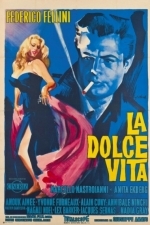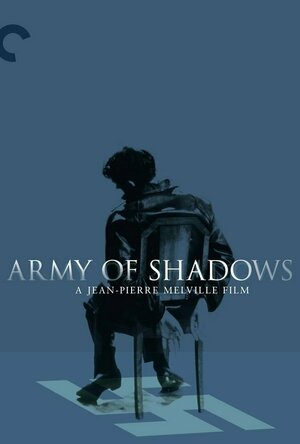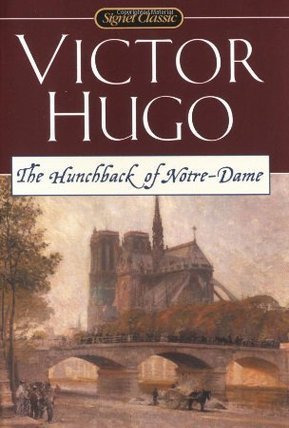Search
Search results
Olivier Assayas recommended La Dolce Vita (1960) in Movies (curated)
Olivier Assayas recommended Army of Shadows (L'Armée des ombres) (1969) in Movies (curated)
The Bandersnatch (199 KP) rated The Hunchback of Notre-Dame in Books
Nov 7, 2019
The Hunchback of Notre Dame is set in 1829's Paris, France where the gypsy Esmeralda (Born Agnes) captures the hearts of several men including captain Phoebus and Pierre Gringoire but especially Quasimodo the bell ringer and his guardian the Archdeacon Claude Frollo.
Frollo orders Quasimodo to bring Esmeralda to him and after a lot of chaos where the guards under Phoebus capture Quasimodo, Gringoire is knocked out and only rescued from hanging when Esmeralda saves him with promise of marriage and Quasimodo flogged and placed on a pillory for several hours of public exposure. When Esmeralda is accused of attempted murder Quasimodo helps by giving her space in the cathedral of Notre Dame under law of sanctuary. Frollo finds out that the court of parliament has voted the removal of Esmeralda's right for sanctuary and orders her to be taken and killed. Clopin the head of the gypsies hears this and leads a rescue party to help Esmeralda. During the chaos Quasimodo mistakes who is wanting to help the Gypsy he loves and ends up in aiding in her arrest. Frollo after failing to win her love betrays Esmeralda and sends her to be hung. Frollo laughs as Esmeralda dies and is pushed from the top of the Cathedral by Quasimodo. Quasimodo dies of starvation after joining Esmeralda's body in the cemetery.
Victor Hugo began writing the book in 1829The novels original title was Notre Dame de Paris, it was largely to make his contemporaries more aware of the value of the Gothic architecture, Notre Dame Cathedral had been in disrepair at the time and along with other buildings which were neglected and often destroyed to be replaced by new buildings or defaced by replacement of parts of buildings in a newer style. During the summer of 1830 Gosselin demanded that Hugo complete the book by February 1831, Hugo -starting in September 1830- worked non stop on the book finishing it six months later. Several ballets, comics, TV show, theatre, music, musical theatre and films have been inspired by The Hunchback of Notre Dame most notably has been the 1996 Walt Disney animated movie of the same name.
I think that The Hunchback of Notre Dame is a very prolific book which promotes the fact that it doesn't matter what you look like on the outside, its how you deal with people and what is on the inside that counts. The books portrayal of the romantic era as an extreme through the architecture, passion and religion as well as the exploration of determinism, revolution and social strife adds to the ultimately magical make up of the book. I believe that most people would see themselves in the position of Quasimodo, Esmeralda and Phoebus rather than that of Frollo. I know I certainly wouldn't see myself otherwise.
Victor Marie Hugo was born on February 26th 1802 in Besançon. eastern Franche-Combe as the third son of Joseph Leopold Sigisbert Hugo (1774-1828) and Sophie Trebuchet (1772-1821). Victor was a French poet, novelist and dramatist of the romantic movement, he's also considered one of the greatest and best known French writers. Victors childhood was a period of national political turmoil with Napoleon being proclaimed Emperor two years after he was born and the Bourbon monarchy was restored before his 13th birthday. His parents held vastly different political and religious views which prompted a brief separation in 1803, during that time Hugo's mother dominated his education and upbringing. Hugos work reflected her devotion to king and faith. However during the events leading up to France's 1848 revolution, Hugos work changed to that of Republicanism and free thought. Hugo went on to married to his childhood sweetheart Adele Foucher in 1822 and they had five children.
Victor Hugo's works hold a vast collection of poetry, novels and music. His first Novel Han D'Islande was published in 1823 and he published five volumes of poetry between 1829 and 1840 which cemented his reputation as a great elagiac and lyric poet. Hugos first mature work of fiction was published in February 1829 by Charles Gosselin without his name attached, this would infuse with his later work Le Dernier Jour d'un Condamne (The last day of a Condemned man) and go on to not only influence other writers including Charles Dickens and Albert Camus, and be a precursor to Hugo's work Les Miserables published in 1862.
After three attempts Hugo was finally elected to Academie francaise in 1841and in 1845 King Louis-Phillipe elevated him to the peerage and in 1848 he was elected to the national assembly of the second republic. When Louis Napoleon the 3rd seized power in 1851 Hugo openly declared him a traitor to France then relocated to Brussels, Jersey (where he was thrown out of for supporting a paper criticising Queen Victoria) and ending up in guernsey where he remained an exile until 1870. after returning to France a hero in 1870 Hugo spent the rest of his life writing and just living and died from pneumonia on may 22nd 1885 at the age of 83. He was given a state funeral by degree of president Jules Grevy, more than two million people joined his funeral procession in Paris which went form the Arc Du Triomphe to the Pantheon where he was consequently buried, he shared a crypt with Alexandre Dumas and Emile Zola. Most French towns and cities have streets named after him.
Victor Hugo in my opinion is one of those naturally born creative souls who had felt compelled to both write and at least try to make the world a better place. He definitely attempted to do so from the positions he accumulated in his life time and despite this the three mistresses he had in his later years definitely shows that his love life left something to be desired.
And there you have it a book for all the ages, its definitely under the banner of AWESOME!!!.
Frollo orders Quasimodo to bring Esmeralda to him and after a lot of chaos where the guards under Phoebus capture Quasimodo, Gringoire is knocked out and only rescued from hanging when Esmeralda saves him with promise of marriage and Quasimodo flogged and placed on a pillory for several hours of public exposure. When Esmeralda is accused of attempted murder Quasimodo helps by giving her space in the cathedral of Notre Dame under law of sanctuary. Frollo finds out that the court of parliament has voted the removal of Esmeralda's right for sanctuary and orders her to be taken and killed. Clopin the head of the gypsies hears this and leads a rescue party to help Esmeralda. During the chaos Quasimodo mistakes who is wanting to help the Gypsy he loves and ends up in aiding in her arrest. Frollo after failing to win her love betrays Esmeralda and sends her to be hung. Frollo laughs as Esmeralda dies and is pushed from the top of the Cathedral by Quasimodo. Quasimodo dies of starvation after joining Esmeralda's body in the cemetery.
Victor Hugo began writing the book in 1829The novels original title was Notre Dame de Paris, it was largely to make his contemporaries more aware of the value of the Gothic architecture, Notre Dame Cathedral had been in disrepair at the time and along with other buildings which were neglected and often destroyed to be replaced by new buildings or defaced by replacement of parts of buildings in a newer style. During the summer of 1830 Gosselin demanded that Hugo complete the book by February 1831, Hugo -starting in September 1830- worked non stop on the book finishing it six months later. Several ballets, comics, TV show, theatre, music, musical theatre and films have been inspired by The Hunchback of Notre Dame most notably has been the 1996 Walt Disney animated movie of the same name.
I think that The Hunchback of Notre Dame is a very prolific book which promotes the fact that it doesn't matter what you look like on the outside, its how you deal with people and what is on the inside that counts. The books portrayal of the romantic era as an extreme through the architecture, passion and religion as well as the exploration of determinism, revolution and social strife adds to the ultimately magical make up of the book. I believe that most people would see themselves in the position of Quasimodo, Esmeralda and Phoebus rather than that of Frollo. I know I certainly wouldn't see myself otherwise.
Victor Marie Hugo was born on February 26th 1802 in Besançon. eastern Franche-Combe as the third son of Joseph Leopold Sigisbert Hugo (1774-1828) and Sophie Trebuchet (1772-1821). Victor was a French poet, novelist and dramatist of the romantic movement, he's also considered one of the greatest and best known French writers. Victors childhood was a period of national political turmoil with Napoleon being proclaimed Emperor two years after he was born and the Bourbon monarchy was restored before his 13th birthday. His parents held vastly different political and religious views which prompted a brief separation in 1803, during that time Hugo's mother dominated his education and upbringing. Hugos work reflected her devotion to king and faith. However during the events leading up to France's 1848 revolution, Hugos work changed to that of Republicanism and free thought. Hugo went on to married to his childhood sweetheart Adele Foucher in 1822 and they had five children.
Victor Hugo's works hold a vast collection of poetry, novels and music. His first Novel Han D'Islande was published in 1823 and he published five volumes of poetry between 1829 and 1840 which cemented his reputation as a great elagiac and lyric poet. Hugos first mature work of fiction was published in February 1829 by Charles Gosselin without his name attached, this would infuse with his later work Le Dernier Jour d'un Condamne (The last day of a Condemned man) and go on to not only influence other writers including Charles Dickens and Albert Camus, and be a precursor to Hugo's work Les Miserables published in 1862.
After three attempts Hugo was finally elected to Academie francaise in 1841and in 1845 King Louis-Phillipe elevated him to the peerage and in 1848 he was elected to the national assembly of the second republic. When Louis Napoleon the 3rd seized power in 1851 Hugo openly declared him a traitor to France then relocated to Brussels, Jersey (where he was thrown out of for supporting a paper criticising Queen Victoria) and ending up in guernsey where he remained an exile until 1870. after returning to France a hero in 1870 Hugo spent the rest of his life writing and just living and died from pneumonia on may 22nd 1885 at the age of 83. He was given a state funeral by degree of president Jules Grevy, more than two million people joined his funeral procession in Paris which went form the Arc Du Triomphe to the Pantheon where he was consequently buried, he shared a crypt with Alexandre Dumas and Emile Zola. Most French towns and cities have streets named after him.
Victor Hugo in my opinion is one of those naturally born creative souls who had felt compelled to both write and at least try to make the world a better place. He definitely attempted to do so from the positions he accumulated in his life time and despite this the three mistresses he had in his later years definitely shows that his love life left something to be desired.
And there you have it a book for all the ages, its definitely under the banner of AWESOME!!!.


